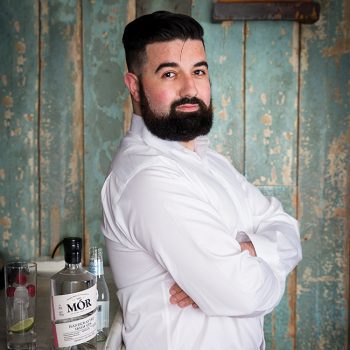SB meets… Eoin Bara, Tipple
From distiller to distributor, there are few roles the CEO of Tipple has not tried his hand at. That, he says, is what makes his company understand the challenges facing distribution and logistics better than any other.

*This feature was originally published in the May 2024 issue of The Spirits Business magazine.
Tell us about your background in spirits.
In 2015, I set up a gin distillery, called Mór Irish Gin, in Tullamore in Ireland. We made three products, which were all a bit crazy: the first was a wild berry Gin; the second product was a pineapple Gin – because pineapple is the international symbol of hospitality and Ireland is the land of 1,000 welcomes. Finally, we made a London Dry style with four types of juniper, and ivy flower. We sold and exited the business in 2022.
What inspired Tipple?
In 2019, we were trying to grow as a brand, but were struggling to get distribution. There were lots of gins around, lots of customers coming from overseas to Ireland, loving the product but then being unable to buy it in their home countries. It’s super complicated to buy alcohol on the internet.
We spent two-and-a-half years figuring out how to do it. Rather than having a warehouse in every country, we thought, why can’t we create one warehouse with cross-border access that we can manage centrally.
Then we realised, this is a big problem and if we have it, others will have it too. We’ve more than one warehouse at this stage, one in Antwerp, one in Amsterdam, we’re about to open a new one outside of Paris, one in the UK, and about to open one in Ireland.
Ireland will probably be in the next two months, July or August; Paris will open in July. It will be will be our business-to-business (B2B) warehouse.
Which services do you provide?
We do a lot of things: to make it super simple, we have a plug-in for the store that brands can use on their website, which means from a tech point of view, there’s no big overhead. Then we handle all the VAT, excises and social charges, then the picking, packing, and shipping direct to consumers. The brand just has to get the bottle sold, and they usually have a Shopify store themselves. For B2B, you may have a bar or restaurant that wants to buy directly, so you can view B2B pricing and can deliver directly to that.
How have you seen e-commerce evolve in the last few years?
If you look at the US, it’s five to six years ahead; Europe is way behind, but it’s starting to wake up. Covid forced people to buy booze online. It showed you can’t just depend on the on-trade. Brands are taking more of an omnichannel approach.
What are Tipple’s key benefits for direct-to-consumer (DTC) and B2B?
It opens up a whole new channel. Selling direct to consumers isn’t something that’s widely done in the alcohol industry. The way non-alcohol businesses work is based on an omnichannel; the idea here is not to replace the distributor. We’re trying to help brands grow their business using DTC advertising. We want to make it like any other industry, breaking down barriers by handling all the boring bits nobody else wants to do – and they shouldn’t have to. In no other industry are you forced to, even if you don’t have a distributor.
What sets Tipple apart from other software-as-a-service companies?
We’re tech-focused, and we are ex-founders of alcohol businesses. We know the industry intimately. Few people can say: “I’ve cleaned stills.” When you’re the founder of a small business, you do the taxes, the distilling, and so on. Tipple is specifically built for the alcohol industry, large and small. We’ve built something so customisable it solves every need. We also allow brands to sell on Amazon. We are building infrastructure for the alcohol industry globally. The idea is to take as much work off the brand as possible.
Related news
Perfect storm: the mental health of the drinks industry
